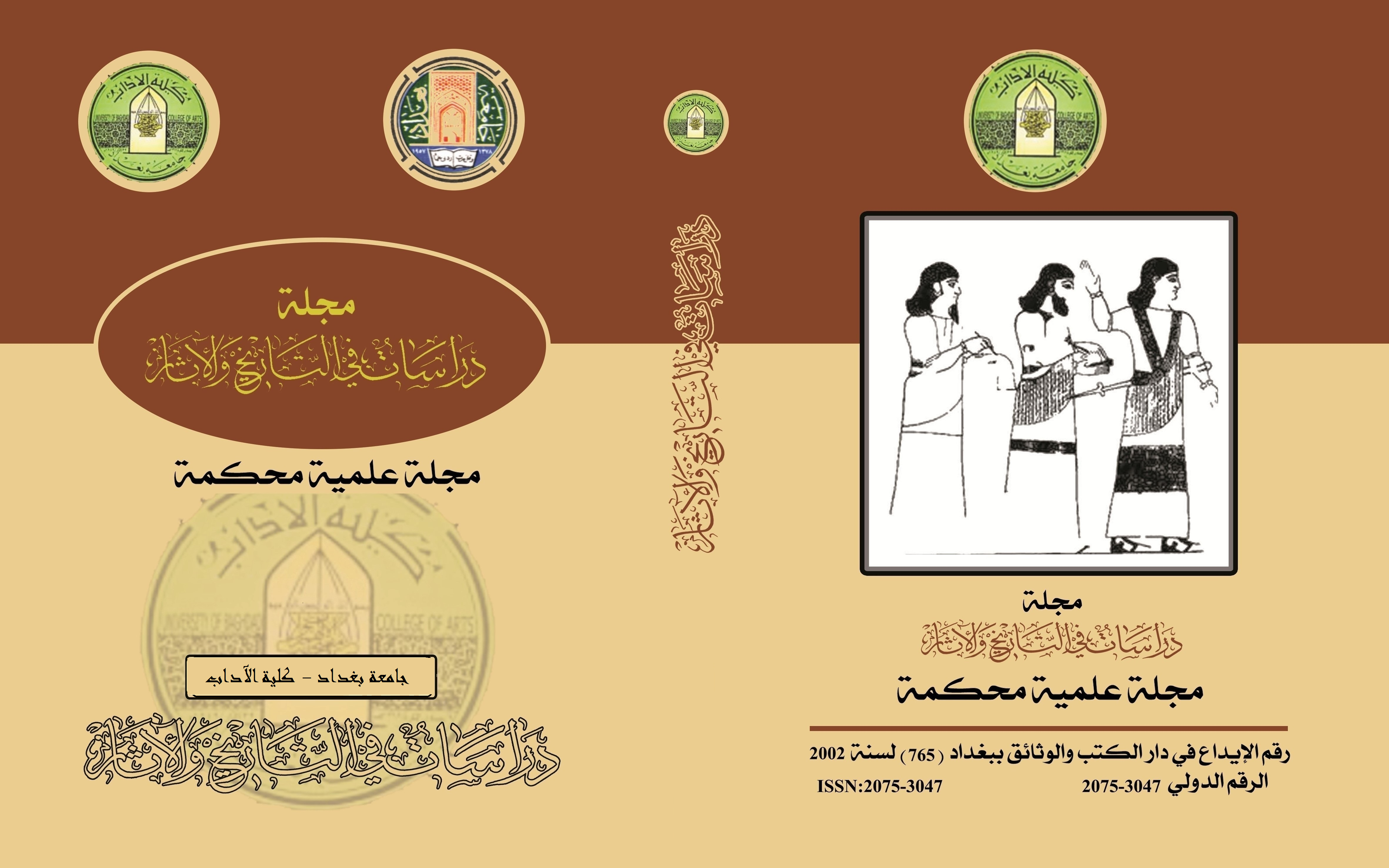غاية مناهج كتب الاقتصاد الإسلامي حتى نهاية القرن الرابع الهجري
DOI:
https://doi.org/10.65074/vvxs5d69الكلمات المفتاحية:
مناهج ، غاية ، كتب ، الإقتصاد ، الإسلاميالملخص
يعد علم الإقتصاد من العلوم المهمة التي ظهرت في العصور الإسلامية الأولى نتيجة لظهور العديد من القضايا المالية وقد وفق العلماء المسلمين في تصنيف العديد من المؤلفات المختصة في الإقتصاد الإسلامي وضحو بها المسائل المالية وفقاً للشريعة الإسلامية كالزكاة والجزية والفيء والغنيمة والخراج وغيرها من المسائل ووضعوا الشروح والتفصيلات لها مبينا كل واحداً منهم رأيه إزاء هذه المسائل ويقوم الإقتصاد الإسلامي على عدة اركان وهي ان المالك الحقيقي للمال هو الله عز وجل وله الحق سبحانه ان يحدد تصرفاتهم وفق لاما يعلمه من حالهم وما يصلح شؤونهم وعدم الإضرار بحقوق الآخرين او المصلحة العامة وحماية مصالح بعض الفئات المحتاجة من منافسة الغير لهم كما هو الحال في مصارف الزكاة والإلزام بالنفقة على الأقارب ومن هنا تكمن أهمية هذا البحث
المراجع
المصادر:
1ـ القرآن الكريم
2- عثمان ، حسن ، منهج البحث التاريخي ، ( دار المعارف ، القاهرة ، ط8) .
3ـ حاجي ، خليفه ، عبد الله ، كشف الظنون عن اسامي الكتب والفنون ، ( دار إحياء التراث العربي ، بيروت) .
4ـ ابي يوسف يعقوب بن إبراهيم ( ت 182هـ) ، كتاب الخراج ، ( دار المعرف للطباعه والنشر ، بيروت ، 1979م ) .
5ـ النقيب، مرتضى حسن ، المؤرخ المبتدئ ومنهج البحث التاريخي ، ( بغداد ، كلية الاداب ، 1999م ) .
6ـ الكبيسي ، حمدان عبد المجيد ، في الفكر الاقتصادي الاسلامي ، ( ديوان الوقف السني ، بغداد ، 2013م) .
7- محمود ، يسرى عبد الوهاب تأثير منهج التربية الفنية في تكوين الشخصية المهنية لدى الطلبة. (2023). مجلة كلية التربية الاساسية الجامعة المستنصرية, 1
8- حريب ، كرار ناصر ، منهجية العملية ونماذج التنظيم الاجتماعي -بحث في الانثروبولوجيا الاجتماعية، ( مجلة كلية الآداب ، الجامعة المستنصرية ، م 45، العدد98، 2022م) .
9- فارس ، رشا عيسى . (2020). منهج النقد التأريخي لمرويات ابن حجر في كتابه الدرر الكامنة في أعيان المائة الثامنة. مجلة المستنصرية للعلوم والتربية, 16(4), 259–280.
10- ابي عبيد ، القاسم بن سلام ( ت 224هـ) ، الاموال ، تقديم ودراسة وتحقيق محمد عماد ، ( دار الشروق ، بيروت ، 1989م ) .
11- ابن زنجويه ، حميد( ت251هـ) ، كتاب الاموال ، تحقيق شاكر ذيب فياض ، ( مركز الملك فيصل للبحوث والدراسات الاسلامية ، 1986م ).
12- ابن الاثير ، ضياء الدين نصر الله بن محمد ( ت 637هـ ) ، المثل السائر في أدب الكاتب والشاعر ، المحقق أحمد الجوني ، بدوي طنانه ، ( دار نهضة مصر للطباعه والنشر والتوزيع ، القاهره ) .
13ـ اليعقوبي ، احمد بن ابي يعقوب بن جعفر بن وهب ابن واضح ( ت 292هـ ) ، تاريخ اليعقوبي ، تحقيق عبد الأمير مهنا، ( شركة الاعلمي للمطبوعات ، بيروت ، 2010م ) .
14ـ الطبري ، محمد بن جرير بن يزيد بن كثير بن غالب الآملي ( ت 310هـ ) ، جامع البيان في تاويل القرآن ، المحقق احمد محمد شاكر ، ( مؤسسة الرسالة ، 2000م ) .
15ـ قدامه ، بن جعفر ( ت 337هـ ) ، الخراج وصناعة الكتابة ، شرح وتحقيق محمد حسين الزبيدي ، ( دار الرشيد للنشر ، 1981م ) .
16- ابن الاثير ، مجد الدين ابو السعادات المبارك بن محمد بن محمد ابن عبد الكريم الشيباني الجزري ( ت 606هـ ) ، النهاية في غريب الحديث والأثر ، تحقيق طاهر احمد الزاوي ، محمود محمد الطناجي ، ( المكتبة العلمية بيروت ، 1979م ) .
17ـ ابن الاثير علي بن ابي الكرم محمد بن عبد الكريم بن عبد الواحد الشيباني ( ت 630هـ) ، الكامل في التاريخ ، تحقيق عمر عبد السلام تدمري ، ( دار الكتاب المصري ، بيروت ، 1997م ) .
18 -الرازي ، زين الدين ابو عبد الله محمدبن ابي بكر بن عبد القادر الحنفي ( ت 666هـ) ، مختار الصحاح ، المحقق يوسف الشيخ محمد ، ( المكتبه المصريه ، الدار النموذجيه ، بيروت ، 1999م ) .
19ـ ابن منظور ، محمد بن مكرم بن علي ابو الفضل جمال الدين الانصاري الافريقي ( ت 711هـ ) ، لسان العرب ، ( دار صادر ، بيروت ، ط2، 1441هـ) .
20ـ ابن خلدون ، عبد الرحمن ( ت808هـ ) ، مقدمة ابن خلدون ، ( دار الكتب العلمية ، بيروت ، 2003م ) .
21ـ الجرجاني ، علي بن محمد بن علي الزين الشريف ( ت 816هـ ) ، التعريفات، ضبطه وصححه جماعه من العلماء ، ( دار الكتب العلمية ، بيروت ، 1983م ) .
22ـ محمد علي ، يحيى ، غاية منهج البحث التاريخي عند الطبري وابن خلدون ، بحث غير منشور .
23ـ خليل ، عماد الدين ، التفسير الاسلامي للتاريخ ، ( دار العلم للملايين ، بيروت ، 1975م )
24ـ المفتي ، عبد الرحمن ، المدخل الى اعداد البحث ، ( دار الكتب العلمية ، بيروت ) .
References
The Holy Qur'an
1-Abu Yusuf Ya'qub ibn Ibrahim (d. 182 AH), The Book of Taxes, (Dar al-Ma'rif for Printing and Publishing).Beirut, 1979 CE
2-Abi Ubaid, al-Qasim ibn Salam (d. 224 AH),The book of Money, presented, studied, and verified by Muhammad Imad, (Dar al-Shorouk, Beirut, 1989 CE)
3-Ibn Zanjawayh, Hamid (d. 251 AH), The Book of Money, verified by Shaker Nayyab Fayyad, (King Faisal Center for Islamic Research and Studies, 1986 CE)
4-Al-Ya'qubi, Ahmad ibn Abi Ya'qub ibn Ja'far ibn Wahb ibn Wadhah (d. 292 AH), The History of Al-Ya'qubi, verified by Abdul Amir Mahna (Al-A'lami Printing Company, Beirut, 2010 CE)
5-Al-Tabari, Muhammad ibn Jarir ibn Yazid ibn Kathir ibn Ghalib al-Amli (d. 310 AH), Jami' al-Bayan fi Ta'wil al-Qur'an, edited by Ahmad Muhammad Shakir, (Al-Risala Foundation, 2000 AD).
6-Dar al-Rashid Publishing House (1981 AD). Qudamah ibn Ja'far (d. 337 AH), Taxation and the Art of Writing, explained and edited by Muhammad Husayn al-Zubaidi Dar al-Rashid Publishing House1981AD)
7-Ibn al-Athir, Majd al-Din Abu al-Sa'adat al-Mubarak ibn Muhammad ibn Muhammad ibn Abd al-Karim al-Shaybani al-Jazarm (d. 606 AH), The End of the Strange Hadith and Tradition, edited by Tahir Ahmad al-Zawi and Mahmoud Muhammad al-Tanaji,(Al-Maktaba al-Ilmiyyah, Beirut 1979 AD).
8-Ibn al-Athir Ali ibn Abi al-Karm Muhammad ibn Abd al-Karim ibn Abd al-Wahid al-Shaybani (d. 630 AH),complete history, edited by Omar Abd al-Salam Tadmuri, (Dar al-Kitab al-Masri, Beirut, 1997 AD). .
9-Ibn al-Athir, Diya' al-Din Nasrallah ibn Muhammad (d. 637 AH), The Common Proverb in the Literature of the Writer and Poet, Investigated by Ahmad al-Juni, Badawi Tanana, (Dar Nahdat Misr for Printing, Publishing, and Distribution, Cairo).
10-Al-Razi Zayn al-Din Abu Abdullah Muhammad ibn Abi Bakr ibn Abd al-Qadir al-Hanafi (d. 666 AH), Mukhtar al-Sihah, al-Mutlaq Yusuf al-Shaykh Muhammad, (The Egyptian Library - Dar al-Namuthajiyah, Beirut - 1999 CE).
11-Ibn manzur,Muhammad bin Makram bin Ali Abu Jamal al-Din al-Ansari al-Eurobi (d. 711 AH), Lisan al-Arab (Dar Sadir Beirut 1441 AH)
12-Ibn Khaldun, Abd al-Rahman (d. 808 AH), The Introduction to Ibn Khaldun (Dar al-Kutub al-Ilmiyyah, Beirut 2003).
13-al-Jurjani, Ali ibn Muhammad ibn Ali al-Zayn al-Sharif (d. 816 AH), Definitions, Edited and Corrected by a Group of Scholars (Dar al-Kutub al-Ilmiyyah, Beirut 1983).
14-Muhammad Ali, Yahya, The Final Methodology of Historical Research according to al-Tabari and Ibn Khaldun, unpublished research.
15-Khalil, Imad al-Din, The Islamic Interpretation of History (Dar al-Ilm lil-Malayin, Beirut 1915).
16-Al-Malati, Abdul Rahman, Introduction to Research Preparation, (Dar Al-Kutub Al-Ilmiyyah, Beirut)
17-Othman, Hassan, The Methodology of Historical Research, (Dar Al-Maaref, Cairo, 1st ed.)
18-Hajji, Khalifa Abdullah, Uncovering Suspicions about the Names of Books and Arts, (Dar Ihya’ al-Turath al-Arabi, Beirut).
19-al-Naqeeb, Murtadha Hussein, The Primitive Historian and the Methodology of Historical Research (Badad, College of Arts)
20-al-Kubaisi, Hamdan Abdul Majeed, On Islamic Economic Thought (Diwan al-Waqf al-Sunni, Baghdad (2013)
21-Mahmoud, Yusra Abdu The Effect of the Art Education Curriculum on the Formation of Professional Personality among Students,( 2023),Journal of the College of Basic Education
22-Harib, Karar Nasser, Methodology of the Process and Models of Social Organization: A Study in Social Anthropology (Journal of the College of Arts, Al-Mustansiriya University, Vol. 45, No. 98, (2022)).
23-Faris, Rasha Nasser, The Method of Historical Criticism of Ibn Hajar’s Narrations in His Book Al-Durar Al-Kamina fi A’yun Al-Ma’at Al-Thamina, Al-Mustansiriya Journal of Science and Education 16(4), 259-280.
التنزيلات
منشور
إصدار
القسم
الرخصة

هذا العمل مرخص بموجب Creative Commons Attribution 4.0 International License.
:حقوق الطبع والنشر والترخيص
بالنسبة لجميع البحوث المنشورة في مجلة دراسات في التاريخ والآثار، يحتفظ الباحثون بحقوق النشر. يتم ترخيص البحوث بموجب ترخيص Creative Commons CC BY 4.0 المفتوح ، مما يعني أنه يجوز لأي شخص تنزيل البحث وقراءته مجانًا. بالإضافة إلى ذلك ، يجوز إعادة استخدام البحث واقتباسه شريطة أن يتم الاستشهاد المصدر المنشور الأصلي. تتيح هذه الشروط الاستخدام الأقصى لعمل الباحث وعرضه.
:إعادة إنتاج البحوث المنشورة من الناشرين الآخرين
من الضروري للغاية أن يحصل الباحثون على إذن لإعادة إنتاج أي بحث منشورة (أشكال أو مخططات أو جداول أو أي مقتطفات من نص) لا يدخل في نطاق الملكية العامة أو لا يملكون حقوق نشرها. يجب أن يطلب الباحثون إذنًا من مؤلف حقوق النشر (عادة ما يكون الناشر).
يطلب الإذن في الحالات التالية:
بحوثك الخاصة المنشورة من قِبل ناشرين آخرين ولم تحتفظ بحقوق النشر الخاصة بها.
مقتطفات كبيرة من بحوث أي شخص أو سلسلة من البحوث المنشورة.
استخدم الجداول والرسوم البيانية والمخططات والمخططات والأعمال الفنية إذا لم يتم التعديل عليها.
الصور الفوتوغرافية التي لا تملك حقوق لنشرها.
لا يطلب الإذن في الحالات التالية:
إعادة بناء الجدول الخاص بك مع البيانات المنشورة بالفعل في مكان آخر. يرجى ملاحظة أنه في هذه الحالة يجب عليك ذكر مصدر البيانات في شكل "بيانات من ..." أو "مقتبس من ...".
تعتبر عروض الأسعار القصيرة معقولة الاستخدام العادل ، وبالتالي لا تتطلب إذنًا.
الرسوم البيانية ، الرسوم البيانية ، المخططات ، الأعمال الفنية التي أعاد الباحث رسمها بالكامل والتي تم تغييرها بشكل ملحوظ إلى درجة لا تتطلب الاعتراف.
الحصول على إذن
لتجنب التأخير غير الضروري في عملية النشر ، يجب أن تبدأ في الحصول على أذونات في أقرب وقت ممكن. لا يمكن لمجلة الآداب نشر بحث مقتبس من منشورات أخرى دون إذن.
قد يمنحك مالك حقوق الطبع والنشر تعليمات بشأن شكل الإقرار الواجب اتباعه لتوثيق عمله ؛ بخلاف ذلك ، اتبع النمط: "مستنسخ بإذن من [المؤلف] ، [كتاب / المجلة] ؛ نشره [الناشر] ، [السنة]." في نهاية شرح الجدول ، الشكل أو المخطط.



















